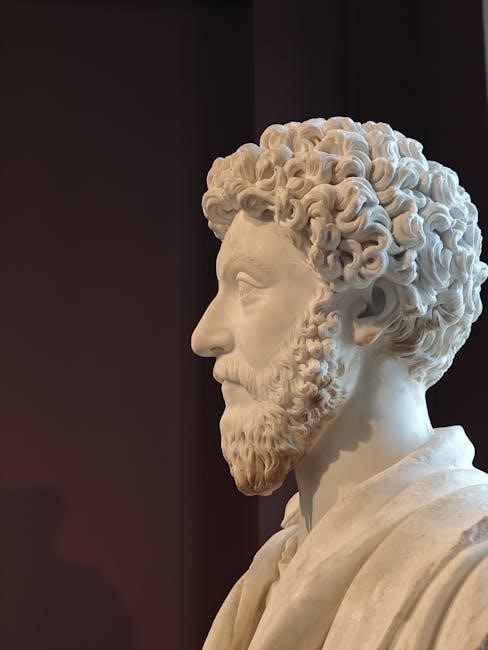Marcus Aurelius, a Roman Emperor and philosopher, authored Meditations, a timeless collection of reflections on Stoic philosophy and personal growth. This work, written during his military campaigns, offers profound insights into self-discipline, resilience, and the human condition, remaining a cornerstone of philosophical thought for centuries.
Overview of Marcus Aurelius and His Legacy
Marcus Aurelius, a Roman Emperor from 161 to 180 AD, is celebrated as a philosopher-king whose wisdom transcends time. His reign, marked by justice and resilience, inspired his personal reflections in Meditations. This timeless work, written during military campaigns, captures his introspective journey, offering insights into Stoic philosophy, self-discipline, and the pursuit of virtue. Aurelius’s legacy endures as a cornerstone of Stoic thought, influencing countless minds. His writings emphasize reason, resilience, and the acceptance of life’s challenges, making him a profound thinker whose ideas remain relevant today.
The Historical Context of Meditations
Marcus Aurelius composed Meditations during his reign as Roman Emperor (161–180 AD), primarily while on military campaigns in the northern regions of the empire. Written in Koine Greek, the text reflects his personal struggles, philosophical musings, and efforts to uphold Stoic principles amidst chaos. The period was marked by external pressures, including wars and plagues, as well as internal challenges like personal loss and leadership burdens. Aurelius’s writings were not intended for publication but served as a private guide for self-improvement and moral clarity. This historical backdrop underscores the practical nature of his philosophy, rooted in real-world adversity and introspection.
Key Themes in Meditations
Meditations explores Stoic philosophy, emphasizing self-discipline, virtue, and rationality. It delves into themes of inner strength, mortality, and living harmoniously with nature, offering timeless wisdom for personal growth.
Stoic Philosophy and Its Core Principles
At the heart of Marcus Aurelius’ Meditations lies Stoic philosophy, which emphasizes reason, self-control, and indifference to external events. The core principles include focusing on what one can control, cultivating virtue through wisdom, courage, justice, and temperance, and accepting life’s challenges with equanimity. Aurelius repeatedly reminds himself to align his actions with nature and the universal order, rejecting emotional turmoil and embracing a life of purpose and resilience. These teachings, rooted in ancient Stoic thought, provide a practical guide for navigating life’s adversities with wisdom and inner strength, making Meditations a timeless source of inspiration.
Living a Philosophical Life
Marcus Aurelius’ Meditations underscores the importance of living a life guided by philosophy, emphasizing the pursuit of virtue and self-awareness. He advocates for a daily commitment to reflection and moral improvement, encouraging individuals to integrate Stoic principles into their routines. Aurelius believed that living philosophically meant embracing simplicity, gratitude, and mindfulness, while rejecting excess and superficiality. His writings serve as a personal guide, urging readers to align their actions with their values and to strive for inner harmony amidst life’s challenges, thus embodying the essence of a philosophical life.
Social Relationships and Human Nature

Marcus Aurelius’ reflections on social relationships and human nature reveal a deep understanding of human behavior. He emphasizes empathy, patience, and kindness, urging readers to tolerate others’ flaws while striving for moral excellence. Aurelius advocates for cooperation and mutual support, viewing social bonds as vital for collective well-being. His writings caution against envy, jealousy, and conflict, encouraging individuals to focus on their own character rather than judging others. By fostering compassion and humility, Aurelius’ insights remain a timeless guide for navigating the complexities of human interaction and fostering harmonious relationships in both personal and societal contexts.
Nature, the Universe, and Mortality
Marcus Aurelius contemplates the vastness of the universe and humanity’s place within it, emphasizing acceptance of natural order. He views life as fleeting, urging mindfulness of mortality to avoid vanity and excess. Aurelius sees death as a natural transition, not an end, encouraging individuals to embrace life’s brevity as motivation for living virtuously. His reflections on cosmic interconnectedness inspire awe and gratitude, fostering a harmonious relationship with nature. By aligning with the universe’s rhythm, one can transcend fear and find peace in the face of the unknown, embodying Stoic resilience and wisdom.
Self-Reflection and Personal Growth
Marcus Aurelius’s Meditations emphasizes the importance of introspection and self-awareness. Through nightly reflections, he cultivated inner strength, humility, and clarity, using these exercises to guide personal development and resilience.
The Practice of Self-Reflection in Meditations
At the heart of Meditations lies Marcus Aurelius’s commitment to self-reflection. Each entry serves as a dialogue with his inner self, exploring emotions, thoughts, and actions. Aurelius practices introspection to align his deeds with Stoic principles, fostering humility and patience. These reflections are not mere musings but purposeful exercises, designed to strengthen his character. By examining his experiences, he aims to cultivate virtues like empathy and generosity, ensuring a life guided by reason and inner peace.

spiritual Exercises for Inner Strength
Marcus Aurelius’s Meditations are filled with spiritual exercises designed to cultivate inner strength. Through nightly reflections, he practiced humility, patience, and empathy, reminding himself to remain steadfast in adversity. These exercises, rooted in Stoic philosophy, aimed to strengthen his character and align his actions with virtue. Aurelius emphasized acceptance of life’s challenges, urging himself not to complain or fear the unknown. His writings reveal a deep commitment to self-improvement, encouraging readers to embrace their mortality and focus on ethical living. These spiritual practices not only guided his personal growth but also informed his leadership, demonstrating the transformative power of introspection and philosophical discipline.

Historical and Cultural Significance
Meditations is a cornerstone of Stoic philosophy, offering timeless wisdom on resilience and ethics. Its personal reflections bridge ancient and modern thought, resonating universally across cultures and eras.
Marcus Aurelius’ Life and Reign
Marcus Aurelius, born in 121 AD, ruled the Roman Empire from 161 to 180 AD. His reign was marked by military conflicts, including wars along the Danube and challenges from the Parthian Empire. Despite these turmoil, he remained a just and thoughtful leader, known for his fairness and adherence to Stoic principles. Aurelius’ life was deeply influenced by philosophy, which he studied rigorously, eventually becoming a prominent Stoic thinker. His personal reflections, later compiled as Meditations, reveal his introspective nature and commitment to self-improvement, offering insights into his character and reign.
The Impact of Meditations on Stoic Thought

Marcus Aurelius’ Meditations has profoundly shaped Stoic philosophy, offering practical wisdom on self-discipline, virtue, and rationality. Its emphasis on inner peace and resilience has influenced countless thinkers, making it a cornerstone of Stoic literature; The text’s accessibility and depth have ensured its relevance, providing timeless guidance on navigating life’s challenges through Stoic principles. Aurelius’ personal reflections have not only preserved Stoic ideas but also expanded their reach, making Meditations a foundational text for understanding and applying Stoicism in modern life. Its enduring impact underscores the universality of its teachings.

Practical Applications of Meditations
Marcus Aurelius’ Meditations offers practical wisdom for modern life, teaching self-discipline, resilience, and rationality. Its principles help individuals cultivate inner strength, navigate change, and embrace life’s challenges with equanimity and personal growth.
How to Apply Stoic Teachings to Modern Life
Stoic philosophy, as outlined in Marcus Aurelius’ Meditations, offers timeless wisdom for modern life. Its core principles—focusing on what can be controlled, embracing change, and cultivating inner strength—remain highly relevant. By practicing mindfulness and gratitude, individuals can navigate life’s challenges with equanimity. Aurelius’ teachings encourage rejecting external validation and instead pursuing virtue and self-discipline. Modern applications include managing stress, fostering resilience, and maintaining clarity in decision-making. The philosophy also emphasizes the importance of living in the present and accepting mortality, fostering a deeper appreciation for life’s fleeting nature. These principles provide a practical framework for personal growth and emotional well-being today.
Cultivating Inner Peace and Resilience
Marcus Aurelius’ Meditations emphasizes the importance of cultivating inner peace and resilience through self-reflection and spiritual exercises. By focusing on what lies within one’s control and accepting life’s impermanence, individuals can maintain composure in the face of adversity. Aurelius advocates for practices such as gratitude, mindfulness, and humility to foster emotional stability. His teachings encourage readers to embrace challenges as opportunities for growth, rather than sources of suffering. By aligning actions with virtue and reason, one can develop the resilience to navigate life’s uncertainties with clarity and equanimity, ultimately achieving a state of inner harmony and peace.
Marcus Aurelius’ Meditations offers timeless wisdom on resilience, self-reflection, and living a virtuous life, remaining a powerful guide for achieving inner peace and harmony in modern times.
The Timeless Wisdom of Meditations
Marcus Aurelius’ Meditations transcends time, offering universal truths on resilience, virtue, and self-discipline. Its insights on embracing life’s challenges, cultivating inner strength, and finding peace amidst chaos remain deeply relevant today. Aurelius’ reflections, rooted in Stoic philosophy, provide a moral compass for modern life, encouraging readers to focus on what truly matters—virtue, gratitude, and living in harmony with nature. This timeless guide continues to inspire individuals seeking wisdom, self-awareness, and a meaningful existence, proving that its teachings are as applicable now as they were centuries ago.

Final Thoughts on the Relevance of Meditations Today

Marcus Aurelius’ Meditations remains a vital guide for modern life, offering timeless wisdom on resilience, self-discipline, and navigating life’s complexities. Its teachings on accepting change, dealing with adversity, and fostering inner peace resonate deeply in today’s fast-paced world. Aurelius’ emphasis on ethical living and personal growth provides a framework for individuals to cultivate meaningful lives, making Meditations a enduring source of inspiration. Its relevance continues to grow, proving that Stoic philosophy’s core principles are as applicable now as they were in ancient times, offering a pathway to a more balanced and purposeful existence.
